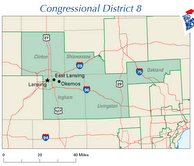After fighting tooth and nail to block expansion of the State Children's Health Insurance Program (SCHIP), Rogers voted to support a watered-down version and happily patted himself on the back for it.
The kindest way to describe this is, ah, somewhat misleading. Here's a fact-based analysis of Rogers' message:Today, the House of Representatives approved an SCHIP extension that incorporates legislation I co-authored earlier this year to fully fund and modestly expand health coverage for millions of poor and low-income children through March 2009. This is a significant victory that protects the needs of the children of America's working poor. The President is expected to sign this measure into law this week.
This measure provides for a clean extension of SCHIP and recognizes our responsibility to ensure that the children's health program is available for children who need it, and not for adults, people who enter the country illegally, or families who already have private insurance.
This legislation increases the programs' funding and keeps the focus where it belongs, on helping low-income kids. The bill fully funds the existing program for an additional 18 months. According to the non-partisan Congressional Budget Office, the funding increases will ensure that no State would have to reduce their SCHIP benefits package or change their current SCHIP eligibility standards due to a lack of federal funding.
1.) It's not clear what Rogers is referring to when he talks about the previous SCHIP legislation he co-authored. If you find it, please let me know. It is clear that he doggedly repeated Bush talking points (no coverage for illegal immigrants, adults or "wealthy" families) all through the fall. This is most likely what was "incorporated" into the final version of the bill.
2.) "Fully funding" SCHIP is a misleading term. Earlier this year, the Bush administration placed considerable eligibility restrictions on the decade-old SCHIP program. Based on these restrictions, 14 states will actually have to drop children from SCHIP coverage. The Kaiser Family Foundation's Daily Health Policy Report offers a good summary:
The measure does not address an SCHIP policy directive announced in August by CMS that states must enroll 95% of children in families with incomes up to 250% of the federal poverty level before expanding eligibility, The Hill reports. Acting CMS Administrator Kerry Weems said that the Bush administration would not require states to disenroll children from the program despite the requirement. House Energy and Commerce Committee Chair John Dingell (D-Mich.) said that Weems' statement contradicts the policy, adding, "Perhaps CMS officials are reading their
directive differently than the rest of us."
An analysis by the Georgetown University Health Policy Institute's Center for Children and Families found that 14 states provide SCHIP coverage to children in families with incomes greater than 250% of the poverty level and that they "will likely be forced to roll back their eligibility levels at some point before August 2008
or assume new coverage costs with state funds." Democratic Caucus Chair Rahm Emanuel (Ill.) on the House floor Wednesday said, "Because of the president's executive order, kids in those states will actually come off the rolls in August." The National Governors Association on Monday sent a letter to Congress asking it to "address the issue raised in the ... guidance issued by CMS" (Young, The Hill, 12/20).
Translation: the new rules will force some children out of SCHIP coverage, since a number of states now cover families with incomes over 250% of the federal poverty level. This is especially true in the Northeast, which has much higher costs of living.
3.) Georgetown University's Center for Children and Families also noted that the requirement to cover 95% of eligible children is unrealistic:
No means-tested program where people have to apply and be reviewed for eligibility has reached this high standard of participation. In fact, Medicare, which is not means tested and where people are enrolled automatically, has a participation rate of about 95 percent. By comparison, the low-income subsidy for the Medicare part D prescription drug benefit, which is means tested, has a participation rate of only 43 percent. SCHIP and Medicaid participation rates are considerably higher—about 63 percent and 79 percent, respectively—but state-level participation rates vary widely and are difficult to measure accurately due to data limitations.
Translation: the 95% rule is an unrealistic standard; even if states try to meet it, there is no accurate way to determine participation rates.
4.) According to Rogers, the final version of the bill excludes adults, illegal immigrants and families with private insurance. There are plenty of posts that cover this in detail, but in a nutshell,
* the SCHIP bills that Bush vetoed did not cover adults. Back in 2005, though, the Bush administration urged states to expand SCHIP coverage to very low-income adults -- so Rogers and Dave Camp co-authored a letter supporting Michigan's participation in this program. Ah, how quickly they forget...
*the SCHIP bills that Bush vetoed did not cover illegal immigrants. In fact, an early version would have required a five-year waiting period for legal immigrant families. This is fear-mongering, pure & simple.
* Families at this income level ($42,925 a year for a family of 3) who have private insurance coverage are most likely getting it through an employer. With the spiraling cost of health insurance, more companies are requiring employees to shoulder a bigger share of the cost. For this hypothetical family, SCHIP coverage may well be more affordable than private coverage. Does Mr. Rogers really intend to micromanage that family's spending choices?
[Remember, SCHIP isn't "free" health care -- it requires premiums and co-pays that are tied to income level. ]
So you can see that this is just another Rogers Special: light on fact, heavy on emotion, and totally useless for working families.





1 comment:
Great post. It infuriates me no one is planning on running against Rogers. I however do not believe he is unbeatable, as long as this district is better informed.
Post a Comment